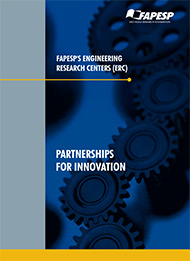Center for Artificial Intelligence supported by FAPESP, IBM and USP starts operating

28 de outubro de 2020
By Elton Alisson | Agência FAPESP – FAPESP, IBM and the University of São Paulo (USP) announced on October 13, 2020, the start of operations at the Center for Artificial Intelligence (C4AI).
Supported by FAPESP via its program of Engineering Research Centers (ERCs), C4AI will be dedicated to leading-edge research on AI to address problems with significant societal and economic impacts. It will be headquartered at InovaUSP, the university’s research and innovation unit, on the main campus in São Paulo City, Brazil. A training arm for students and professionals will begin operating in February 2021 at USP’s Institute of Mathematics and Computer Sciences (ICMC-USP) in São Carlos.
FAPESP and IBM will each invest BRL 2 million per year for the next five years to implement the center’s program, whose activities will be evaluated periodically. USP will invest BRL 4 million per year in laboratories and other facilities, as well as instructors and technical and administrative staff, among other expenses.
“The start of C4AI’s operations represents the continuation of an agreement signed by FAPESP and IBM in 2016, and is part of FAPESP’s unremitting efforts to promote business-academia research partnerships,” said Luiz Eugênio Mello, FAPESP’s Scientific Director, during an online ceremony held to launch the center. “Universities and companies already interact a great deal in the state of São Paulo, but we can always take this interaction further.”
C4AI will initially focus on five major challenges relating to health, environment, food production chains, the future of work, and the development of natural language processing technologies in Brazilian Portuguese, looking for ways to improve human wellbeing and support diversity and inclusion.
In parallel, three advisory committees will be set up to help promote initiatives on issues widely considered important for Brazil in respect of industry, science, and society, seeking to extend the five initial challenges by giving them real-world applications that are useful to organizations and ordinary people.
“We want to identify problems that are strategic for Brazil, for which Brazilian research can make a difference, to which IBM’s researchers can contribute, and that Brazil has the critical mass to address,” said Fabio Cozman, a professor at USP and director of the center.
Research lines
In connection with agriculture, the center’s researchers will focus on the development and application of advanced correlation models to support decision-making based on cause and effect in areas such as water and food security.
With regard to environmental management, they will use machine learning and symbolic knowledge to address complex questions about marine ecosystems and the Blue Amazon, the vast area of the Atlantic extending to 200 nautical miles offshore along Brazil’s 8,500 km coastline, with untold wealth in biodiversity and energy sources. One of the questions they want to answer, for example, is what caused the appearance of oil slicks off the Northeast of Brazil in 2019.
In the field of health, a study will use complex network analysis and multimodal data to improve stroke diagnosis, treatment, and patient rehabilitation protocols.
Another research line will concern high-level natural language processing for Brazilian Portuguese to align it with the state of the art for other languages. Potential applications will range from upgrading of customer care to virtual assistant training, social media monitoring, and analysis and extraction of knowledge from large datasets.
C4AI will also conduct research relating to public policy for AI, and the impact of AI on jobs and the future of work.
“The research agenda encompasses topics that are at the leading edge of AI, so we’ll be in step with what’s being done in other parts of the world,” said Cláudio Pinhanez, an IBM researcher and Deputy Director of C4AI.
C4AI will be the first South American center in IBM’s AI Horizons Network (AIHN), established in 2016 to promote collaboration among the world’s leading universities, students and IBM researchers and accelerate the application of AI to global and local challenges, noted Jeffrey Welser, VP Exploratory Science and University Partnerships, IBM Research.
“We already have centers in the US, Europe, and Asia. This will be the first in South America,” Welser said. “It will be a great opportunity to strengthen our partnerships with universities.”



